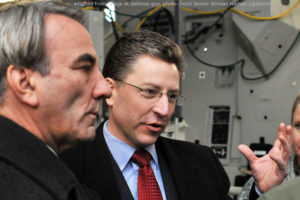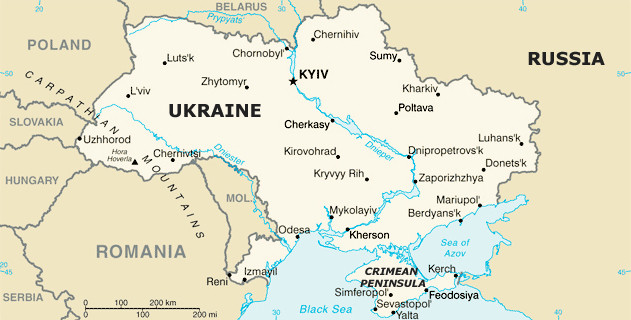More Lethal Weaponry Possible For Ukraine, U.S. Envoy Tells RFE/RL

(Article ©2018 RFE/RL, Inc., Radio Free Europe/Radio Liberty – rferl.org – Christopher Miller – KYIV – Sept. 14, 2018 – also appeared at rferl.org/a/more-lethal-weaponry-possible-for-ukraine-u-s-envoy-says/29489463.html)
The United States is considering sending more lethal weaponry to Kyiv to build up its naval and air defenses, Washington’s special envoy for Ukraine said, as concerns mount that Russia may be stepping up operations in coastal waters.
In an interview with RFE/RL on September 13, Kurt Volker blamed Russia for fueling the conflict. He also said that Washington and Moscow still have serious differences over a possible United Nations peacekeeping force that could be deployed to help bring an end to the fighting in the eastern Donetsk and Luhansk regions.
Volker said he thought that Russian President Vladimir Putin was unwilling to negotiate much of anything related to the conflict at least until after Ukraine’s presidential elections next March, or with “[Ukrainian President Petro] Poroshenko still in power.”
Volker said he has made several overtures to his Russian counterpart, Vladislav Surkov, since their last meeting in Dubai in January, but he has received no response.
In January, Surkov showed interest in the idea of a phased deployment of peacekeepers, Volker said. Since then, however, the Russians “have backed away and have some objections.”
Another meeting is possible, he said, but “right now, there is nothing scheduled.”
Since fighting broke out between government forces and Russia-backed fighters in April 2014, more than 10,000 people have died and more than 1 million have fled their homes.
Russia has repeatedly denied financing and equipping the separatist forces in Donetsk and Luhansk despite overwhelming evidence to the contrary, insisting that the fighting was a civil, internal conflict.
Sea Defense
In recent months, Russia has stepped up naval operations in the shared Sea of Azov, where, Volker said, “Ukrainians have virtually no naval capability or limited capability, so [the Russians] feel they can assert dominance there.”
Ukraine’s lack of robust naval and air-defense capabilities is a weakness Volker said Washington looks set on addressing.
“I think that’s going to be the focus as we develop the next steps in our defense cooperation,” he added.
International negotiators have twice reached a framework for a cease-fire and a road map for peace, known as the Minsk peace accords. Both have failed to hold.
That is due in large part to the fact that Russia continues to flood the territory with fighters and arms, Volker said.
In August, monitors from the Organization for Security and Cooperation in Europe documented — using drone footage — convoys of military trucks crossing to and from Ukraine and Russia on a dirt road under the cover of darkness. Earlier this month, the monitors said another convoy had been spotted in the area.
Russia has not responded to accusations that it was behind the convoys.
Volker also criticized Kyiv, which he said was not doing enough to reach out to Ukrainians living in separatist-held territories. He said Poroshenko’s government has also failed to develop a reintegration plan for when the conflict does end.
Preliminary ideas, he said, “[do not] enjoy strong political backing and there is little emphasis that this should be a priority for the Ukrainian government to figure out how it can reach its own citizens and be as proactive as possible in trying to make their lives better.”
“It’s a shame because those people [living in separatist-held areas] have gone through a lot. It causes them to be very sour on the government in Kyiv,” he added.
He highlighted the cases of elderly people, “people with the least mobility,” and said Kyiv should work with the Red Cross to help get government pensions to those people.
Changing U.S. Policy?
Volker’s appointment, in July 2017, came amid concern that U.S. President Donald Trump was looking to soften Washington’s position on the Ukraine conflict, and Russia’s role in it.
However, the Trump administration has all but continued U.S. backing for Ukraine, a policy set in place by his predecessor, Barack Obama, after Russia’s annexation of Crimea in March 2014.
Washington has provided hundreds of millions of dollars in military equipment and training to the Ukrainian armed forces, and sanctions imposed for the annexation and for fueling the conflict remain in place.
More notably, the Trump administration earlier this year sent Ukraine 210 advanced antitank missiles known as Javelins, a move Obama had resisted for fear of antagonizing Moscow.
“It’s true that we haven’t achieved anything on the ground and we haven’t gotten Russia to really resolve the conflict,” Volker said. “So we have to keep that under advisement.
“On the other hand, what we’ve done over the last year has been very important,” he said.
“We’ve created a policy framework for the United States; we’ve coordinated that with our allies, specifically France and Germany; we’ve given clear support for Ukraine and restoring its sovereignty and territorial integrity; we’ve clarified Russia’s responsibility here,” he said.
In August, Trump suggested in an interview that he would consider lifting Ukraine-related sanctions against Russia “if they do something that would be good for us.”
Asked about Trump’s commitment to Ukraine, Volker said that everything the United States has done for Kyiv “has been done with the president’s approval, so there’s no policy gap.”
“The way I read what the president is doing, [he] is trying to keep a door open for Putin to be able to climb down, negotiate some kind of agreement, see if we can reduce the risk of conflict, see if we can actually create peace in Ukraine,” he said.
“At the same time, the policy has been to continue to layer on additional steps of pushback on Russia and support for Ukraine as a way to induce Russia to negotiate,” he said.
[featured image is file photo from another occasion]

